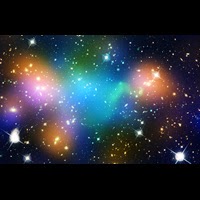According to the modern scientists – the matter we could see
in the Universe doesn’t account for the various happenings in the cosmos. The
modern scientists have many reasons but, one simple example being that the
stars present in the galaxies are rotating at much faster velocities against
the theoretical predictions based on the present scientific theories, primarily
the Einstein’s theory of general relativity and the Quantum mechanics besides
others.
So,
in order to account for the discrepancy the modern scientists suspect that –
there should be some kind of matter lurking in the universe, not visible to us
or not detected by us so far. The modern science holds the view that such
matter [and energy] not in our notice accounts for about ~ 95% in the universe
against what we notice is only about 5%. I. e., all the planets, starts,
galaxies, black holes and galactic dust account for about only 5% in the
universe. The rest of the matter unknown to us is about 95%.
So,
there has been a search for the unknown matter present in the universe, the dark matter.
The universe we live in is made up mainly of the elementary
particle trinity of - electron,
proton and neutron.
There are other particles too in our universe and these are collectively called
as - Baryonic matter.
The modern science suspects that there are other types of matter
particles too apart from the Baryonic
matter and is hiding from our
notice and it accounts for the 95% of the missing matter in the universe.
Here, it is interesting to note that the Hindu scriptures claim
that there are other types of matter too apart from the matter we see
around, which our FIVE sense organs fail to detect. Probably, this could be the dark matter the modern
cosmologists are searching for.
The Hindu cosmological scriptures claim that this universe we live
in is just a small speck in the endless creation, a small wave in the endless
ocean. The Hindu scriptures claim that ‘god’ has created billions and billions
of universes. Even the modern cosmology has a similar belief in the name of - multivese concept.
The Hinduism claims that – these different universes are formed
with different matter particles but, our sense organs fail to catch them all
due to their own limitations. Some of these universes intersect and the
universe we live in - in fact is sharing the ‘void’ [not space! – concept
of space belongs to our universe] with some other universe, i.e.,
there is some other universe
within the universe we live
in but, we fail to notice it with our sense organs. The Hindu scriptures claim
that there are life forms or beings in some of these invisible universes too.
‘We’ and those beings from the other invisible universes hiding around - though
are living side by side, at times are passing through each other – fail
to notice each other.
Hinduism
says some of these invisible
worlds - harbor more matured life
forms than what we are. Some of the names of these alien worlds [invisible universes within our
universe] as mentioned in the Hindu scriptures are: Kinnera loka, Kimpurusha loka,
Gandharva loka.
The
Hindu scriptures claim that – near the Himalayan Mountains one such alien world – invisible world is present, it is
the - Gandharva-loka; it
means the world [loka] of Gandharvas [it is the name of the beings in that
world].
It
is also mentioned in the Hindu scriptures that it is possible for us to visit
those invisible universes with certain spiritual practices and the Hindu sages
were visiting them frequently and those beings too were visiting the India in
the past but, ‘we’ – the ordinary people - fail to notice them as we are not
spiritually matured enough.
So,
these universes that are described by the Hindu scriptures - that are sharing
the ‘void’ with our universe, made up with the exotic particles that ‘we’ [and
our technology] fail to notice – could account for the dark matter the modern
scientists are searching for.
Please
write your comments below and share this article on your social networks.
Thank
you..!


1 comment:
Brilliant and excellent work..
..may 'eeshwar' bless u
Post a Comment